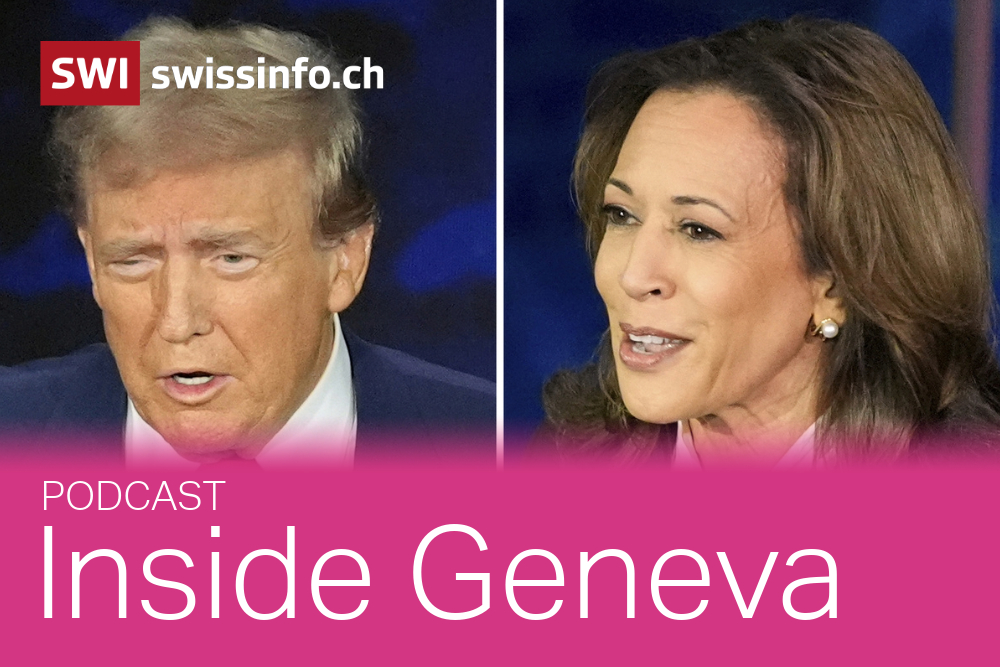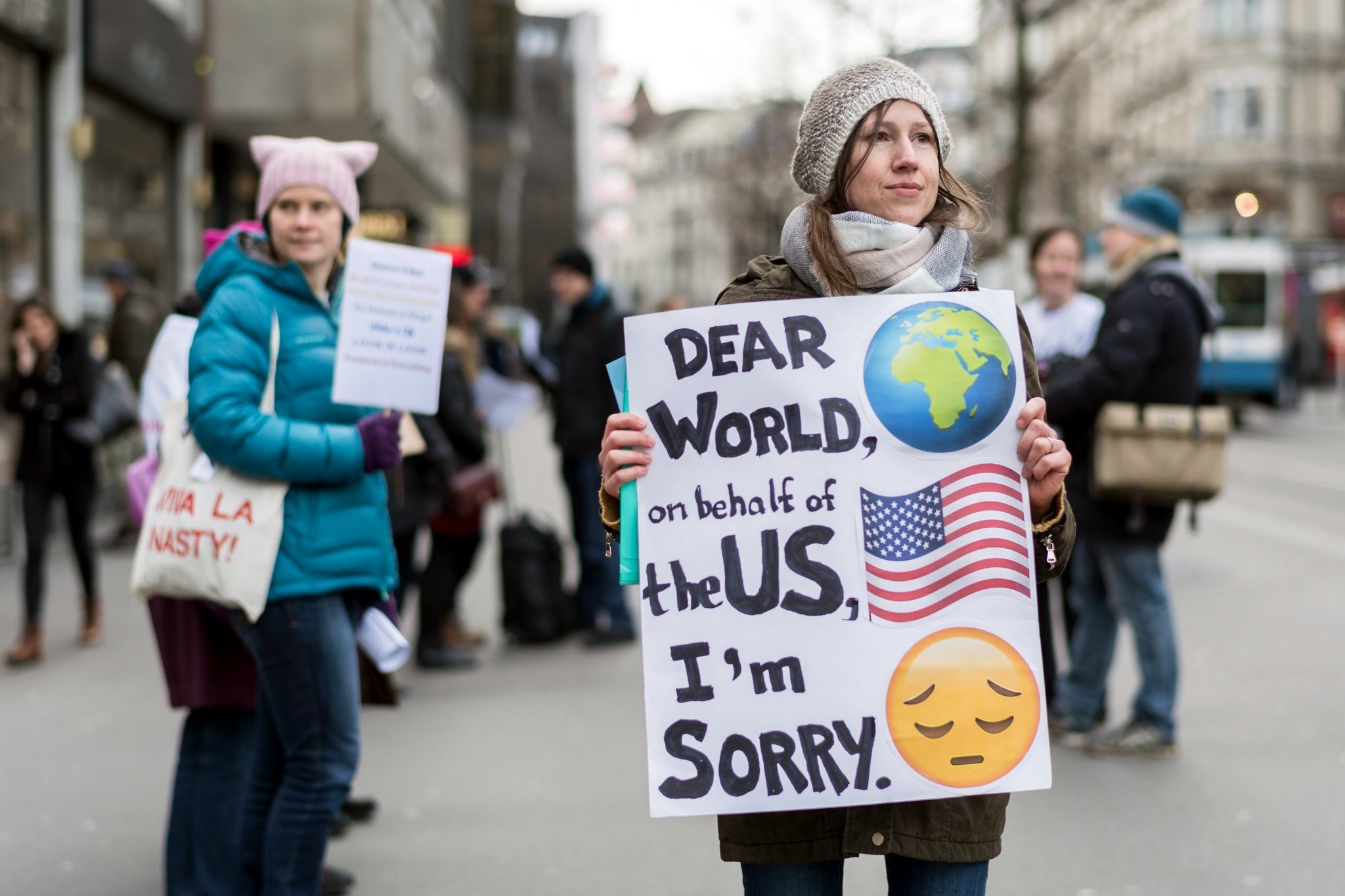What the US presidential elections mean for Geneva
The United States elections are now just a couple of weeks away. Around the world, people are looking anxiously towards Washington. What will the new occupant of the White House, whoever it is, mean for global stability? What will be the consequences for the so-called ‘rules based order’? The order the United Nations was created to uphold?
That’s what we’re discussing on our Inside Geneva podcast this week, with a specific look at what US policy, and a new president, could mean for multilateralism, and the international and humanitarian institutions in Geneva.
For aid agencies, the natural instinct, looking at the presidential race, might be to remember that Donald Trump, during his first term, abandoned the Paris climate accord, left the United Nations human rights council, and threatened to cut all funding to the World Health Organization.
Given the grim state of the world right now, the prospect of Trump being back in the White House is perhaps understandably worrying. But as our analyst Daniel Warner, who joins us on the podcast this week, told me a few weeks ago, foreign policy is unlikely to be a priority for either candidate in this campaign.
And Swedish journalist Gunilla von Hall, who also joins us, brings us her impressions of a recent reporting trip to the US, “when I was in the US, I definitely saw there was no interest for anything called multilateralism or collaboration globally.”
US voters are focussed on their own lives: the cost of living, jobs, immigration.
Does it matter who is in the White House?
Given the waning interest in international affairs, the emphasis on domestic challenges, does it even matter who wins the presidency? In Ukraine, there is concern at Trump’s suggestion he would “do a deal” with Russian president Vladimir Putin on “day one” to end the war. So in that conflict, there is a clear difference between Trump, and Kamala Harris’s suggestion that she supports Ukraine’s territorial integrity.
But in the Middle East, and especially in Gaza, there is a growing sense that neither candidate will do much to stop the bloodshed.

More
Inside Geneva: does it matter to the UN who’s in the White House?
Our third guest on Inside Geneva this week, Tammam Aloudat of Medecins sans Frontieres Netherlands, brings a different perspective. He highlights the disfunction of the current UN structure, particularly at the Security Council, and suggests the challenges to effective multilateralism go much deeper than US disengagement.
“Is multilateralism a system that allows all countries to deal with each other in a civil and non-violent way where common interest prevails?” he asks. “Or is it…a system that allows the continued hegemony of the old powers after World War II?”
It was interesting, in our discussion, to see just how fast our focus turned to the outdated UN power structure, in which the victors in the Second World War (the US, China, Russia, the United Kingdom and France) still each have a powerful veto, which they have used, recently, to paralyse any effective action on conflicts, from Syria, to Ukraine or Gaza.
All our podcast participants agreed that the UN needs reform; it must become a body that fairly reflects a different, post-colonial world, in which other voices are heard. But of course, this is not a new debate. Many determined UN diplomats from less powerful countries have offered sensible plans for reform. All have fallen at the hurdle of the “hegemony” Aloudat talks about. Or, as Warner puts it about the five permanent members of the UN security council “turkeys don’t vote for Christmas.”
Hard cash
But if we accept that reform of the UN is a distant goal, whoever is in power in the US, there is another factor where the occupant of the White House has huge power: money. The US remains one of the biggest, if not the biggest, funder of many UN aid agencies.
Under President Trump, US money for the WHO was in jeopardy in the middle of the global Covid-19 pandemic. Now, across Europe, other countries who stepped in to fill some of the gaps in funding created by the Trump administration are also cutting back their aid budgets.
As our analyst Warner puts it “everything seems to be transactional. What’s in this for me, instead of someone coming in long and saying, for the common good?”
So again, with the US focus inwards, perhaps there’s no guarantee that a Democrat rather than a Republican will protect financial support for multilateralism, or for humanitarian agencies.
Would multilateralism be better without the US?
So would the multilateral system be better off without the world’s only super power? Or would that, given the UN’s structure, simply leave a vacuum that another wannabe superpower would happily fill?
Swedish journalist von Hall, representing, perhaps, the western European tradition of looking to the US as a key ally, still believes firmly that Washington has an important role to play – if it wants to play it.
“It’s a matter of support” she tells Inside Geneva. “Political, financial, moral support to international questions, to international Geneva. I think Europe is there, yes, but Europe will not be able to match the United States. We have a lot of problems in Europe right now, and we have the war in Ukraine to deal with, so there is a need for the United States.”
Aloudat sees things a little differently. Without reform of the UN into a fairer, more representative body, he fears many countries, particularly those in the Global South, will become disillusioned.
“I don’t think…we can afford to sit in an arena where our hope for multilateralism, which still is the United Nations and its institutions, is still…taking the constant bullying of the United States.”
The views of Aloudat and von Hall sound far apart, but actually they are not so different. Both want a multilateral system that is fairer than the current one, both want big, wealthy powers to play a positive, rather than a self-serving role. As von Hall puts it, given all the challenges we face, “the world needs someone who cares.”
The question is, will that be the United States?
To hear the whole discussion, listen to Inside Geneva wherever you get your podcasts.
Edited by Virginie Mangin

In compliance with the JTI standards
More: SWI swissinfo.ch certified by the Journalism Trust Initiative













You can find an overview of ongoing debates with our journalists here . Please join us!
If you want to start a conversation about a topic raised in this article or want to report factual errors, email us at english@swissinfo.ch.